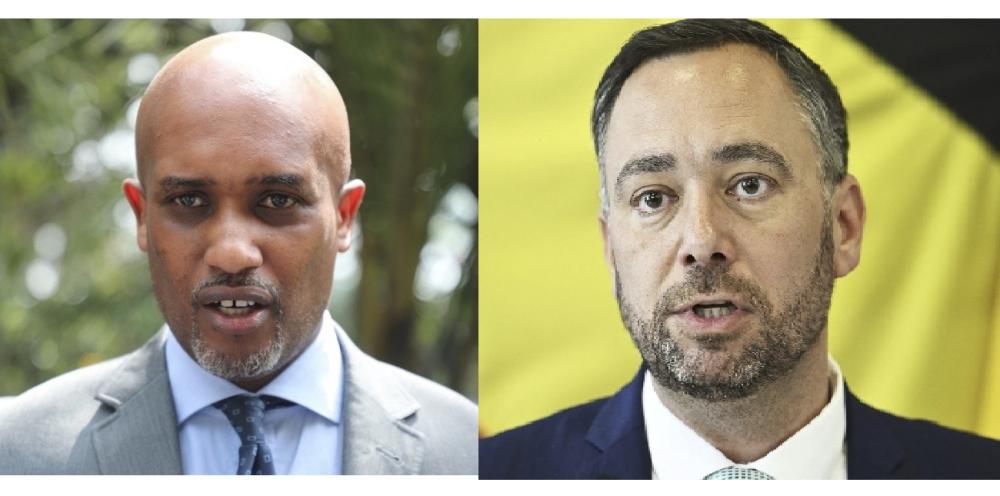Africa-Press – Rwanda. It is unfortunate that Belgian foreign minister Maxime Prevot’s actions, past and present, do not align with his words, Rwanda’s Minister of Justice, Emmanuel Ugirashebuja, stressed on Tuesday, March 18, soon after the former posted on X that in line with the current poor diplomatic relations between the two countries, “Our [Belgium’s] only compass will continue to be respect for human rights.”
Rwanda terminated its development cooperation agreement with Belgium in February. On March 16, President Paul Kagame cautioned Belgium against interfering in Rwanda’s progress and accused Belgium of blaming Rwanda for DR Congo’s problems and conspiring to impose sanctions, despite its dark colonial history of being the root cause of the region’s longstanding problems. A day later, Kigali severed diplomatic ties with Belgium and ordered all Belgian diplomats to leave the country within 48 hours.
Ugirashebuja added: “Time and again, your statements have been diametrically opposed to your actions.”
Earlier, in an interview with Belgian media outlet DH, Prévot said: “Belgium’s only guiding principle will continue to be respect for human rights, the rule of law, and international humanitarian law.”
Starting from colonial times, Ugirashebuja cited a number of historic scenarios where Belgium claimed that it was going to do good and just did the opposite.
He gave an example of 1885 when Belgian King Leopold claimed that his goal in acquiring the so-called “Congo Free State” was “to bring civilization (including human rights) to the people of Congo,” but instead subjected people to brutal forced labour, mutilations, and the death of millions.
“In 1946, under the Trusteeship Agreement with the UN, Belgium committed to “promote human rights and fundamental freedoms for all.” Actions: Belgium promoted ethnic divisions in Rwanda, leaving a legacy of discord that culminated in the 1994 Genocide against the Tutsi,” Ugirashebuja wrote.
He also recalled that in 2000, the Belgian Prime Minister publicly apologised for Belgium’s role in the events leading to the 1994 Genocide against the Tutsi in Rwanda and for fostering divisions during the colonial period, but currently, the European country continues to harbour groups on its territory that propagate genocide denial and ideology.
“Mr. Minister, why should we place trust in your words when your actions consistently tell a different story?” Ugirashebuja asked.
Many other people were infuriated by the Belgian minister’s comments. Some pointed out how, when it comes to human rights, Belgium has a terrible track record in Africa—you know that very well. It has no credibility to speak about human rights on the continent.
“Respect for human rights???” Nathalie Yamb, a Cameroonian and Swiss communication specialist and human resources expert in Europe and Africa, reacted.
She added: “You dare to talk about respecting human rights in a region where your country committed genocide, or where your monarch had the hands of thousands of people cut off and where you have, to this day, not compensated anyone?
https://x.com/Nath_Yamb/status/1901714344351543424
Belgian King Leopold II’s rule in Congo Free State, what is now DR Congo, was so bloody it was eventually condemned by other European colonialists in 1908.
It is estimated that more than 10 million inhabitants of the Congo lost their lives due to the conditions people had to endure to extract raw materials, mainly of rubber.
Leopold II poured the profits into Belgium and into his pockets.
Olivier Karambizi said: “Your compass has lost its North since the time when your King Leopold initiated the Berlin Conference to appropriate this vast territory which he named the Congo Free State. I’m sure you know what happened next.”
Earlier, Jean-Damascène Bizimana, the Minister of National Unity and Civic Engagement, also debunked Prevot’s claims.
Bizimana said that Belgium is known for genocide denial since it funds notorious genocide denial organizations, including CLIIR, led by Joseph Matata, and JAMBO ASBL, founded by nostalgic supporters of PARMEHUTU, including the grandchildren of Mbonyumutwa and the children of genocide perpetrators convicted by the ICTR, such as Placide Kayumba, son of Dominique Ntawukuriryayo (sentenced to 25 years in prison), and Laure Uwase, daughter of Anastase Nkundukozera (sentenced to life imprisonment by Gacaca courts).
Uwase’s mother, Agnès Mukarugomwa, owns Ikondera Libre, a radio station that spreads hatred and genocide denial.
Beyond funding these denialist lobbies, Bizimana said, Belgium has never prosecuted any genocide deniers, despite their presence on its soil, including Belgian nationals like Peter Verlinden, Father Serge Desouter, and others.
On respect for international law, the minister said Belgium does not enforce UN Resolution 2150, which mandates strict measures against FDLR, a DR Congo-based and Belgium-backed terrorist group founded by members of the former Rwandan army and Interahamwe militia that committed the 1994 Genocide against the Tutsi in Rwanda.
“Belgium does not condemn the Tshisekedi regime for arming and collaborating with the FDLR. Like every other European state, Belgium remains silent on the use of mercenaries by the DRC, despite the fact that mercenaries are banned under the 1949 Geneva Conventions and their 1977 Additional Protocols,” the minister said.
British investigative journalist and author Linda Melvern weighed in, saying: “The genocidal forces were defeated in 1994, and not destroyed.
“The FDLR remains committed to completing the genocide against the Tutsi while a campaign of denial is waged world-wide blaming the victims for their fate and fooling the unwary. Genocide remains a crime with no end.”
In Melvern’s latest book, Intent to Deceive: Denying the Genocide of the Tutsi, there is a chapter on the topic of denial. She wrote that at the centre of the denial of the genocide against the Tutsi was the idea that far from any planning, the killings of civilians in April to July 1994 resulted from a spontaneous uprising. This position, she wrote, was most eloquently outlined in the Security Council even as the crime took place, and was written into diplomatic telegrams, letters and cables.
For More News And Analysis About Rwanda Follow Africa-Press






